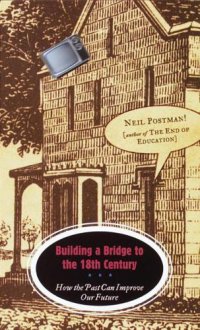
Ebook: Building a bridge to the 18th century : how the past can improve our future
Author: Postman Neil
- Tags: Civilization Modern -- 1950-, United States -- Civilization -- 1970-, Enlightenment., Technology and civilization., Education -- Philosophy., Democracy., Social Science., HISTORY -- World., Civilization., Civilization Modern., United States.
- Year: 2011
- Publisher: Vintage eBooks
- City: New York, United States, United States
- Language: English
- epub
At a time when we are reexamining our values, reeling from the pace of change, witnessing the clash between good instincts and "pragmatism," dealing with the angst of a new millennium, Neil Postman, one of our most distinguished observers of contemporary society, provides for us a source of guidance and inspiration. In Building a Bridge to the Eighteenth Century he revisits the Enlightenment, that great flowering of ideas that provided a humane direction for the future -- ideas that formed our nation and that we would do well to embrace anew.
He turns our attention to Goethe, Voltaire, Rousseau, Diderot, Kant, Edward Gibbon, Adam Smith, Thomas Paine, Jefferson, and Franklin, and to their then-radical thinking about inductive science, religious and political freedom, popular education, rational commerce, the nation-state, progress, and happiness.
Postman calls for a future connected to traditions that provide sane authority and meaningful purpose -- as opposed to an overreliance on technology and an increasing disregard for the lessons of history. And he argues passionately for specific new guidelines in the education of our children, with renewed emphasis on developing the intellect as successfully as we are developing a computer-driven world.
Witty, provocative, and brilliantly reasoned, Building a Bridge to the Eighteenth Century is Neil Postman's most radical, and most commonsensical, book yet.
From the Hardcover edition.
Amazon.com Review
The problem with the world today, says Neil Postman, is that we've become so caught up in hurtling towards the future that we've lost our societal "narrative," a humane cultural tradition that creates "a sense of purpose and continuity"--in other words, something to believe in. "In order to have an agreeable encounter with the twenty-first century," he asserts, "we will have to take into it some good ideas. And in order to do that, we need to look back to take stock of the good ideas available to us." He finds rich source material in the Enlightenment, the salad days for philosophers such as Goethe, Voltaire, Diderot, Paine, and Jefferson, "the beginnings of much that is worthwhile about the modern world." Yet Building a Bridge to the Eighteenth Century is a call for cultural progress, not regression: "I am not suggesting that we become the eighteenth century," Postman notes, "only that we use it for what it is worth and all it is worth."
Chief among the values Postman cites is the development of the intellect; it plays a part in many of his recommendations, from the cultivation of a healthy skepticism towards overhyped technology to sweeping educational reforms that include replacing grammar instruction with logic and rhetoric and introducing courses on comparative religion and the history of science. He also lashes out at postmodernists who start with the premise that language "is a major factor in producing our perceptions, judgments, knowledge, and institutions" and conclude that language is therefore tenuously connected to reality at best. Enlightenment thinkers knew that language molded perception, he notes, but they also believed that "it is possible to use language to say things about the world that are true" and "to communicate ideas to oneself and to others." Postman is excessively curmudgeonly at times, as in his reference to philosopher Jean Baudrillard as "a Frenchman, of all things," or his remarks on the ancient Athenians: "I know they are the classic example of Dead White Males, but we should probably listen to them anyway." But for anybody with a stake in the culture wars, or who wants to apply the lessons of philosophy to the modern world, Building a Bridge to the Eighteenth Century will make for provocative reading.
From Publishers Weekly
"I am not suggesting that we become the eighteenth century, only that we use it for what it is worth and for all it is worth," Postman (Amusing Ourselves to Death; Technopoly) argues in this penetrating, extended essay. Though other periods are rich with learning and wisdom, Postman believes the 18th-century Enlightenment is uniquely valuable and relevant to today's world. It gave us the rationalist notion of human progressAexpressed and supported by science and technologyAand the romantic critique, with its idea of inward progress and its suspicion of the machine. It gave us discursive narrative prose as the prototypical model of thought, along with more subtle, less hysterical critiques of language than postmodernists offer today. It gave us floods of new information, yet ridiculed information as an end in itself, urging a healthy respect for context and purpose. It gave us the idea of childhood as a distinct life stage linked to education and nurturance, illuminated by two contrasting visionsALocke's blank slate to be written on and Rousseau's plant to be cultivated. And it gave us representative democracy. All these were expressions of a world in which the dominant media, unlike today, was the printed word. As that environment fades, the complex tensions Postman illuminates are replaced by shallow sloganeering by those who present themselves as the embodiment of novelty and daring. Postman forcefully argues that we can use the complex legacy of the past to resist being swept into a shiny, simpleminded new dark age. (Oct.)
Copyright 1999 Reed Business Information, Inc.